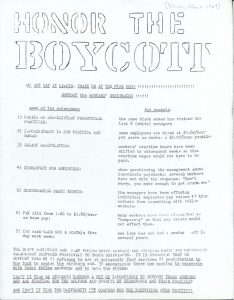
“Honor the Boycott.” Raised My Hand Collection, UNC Libraries, February/March 1969. accessed November 9, 2018. https://exhibits.lib.unc.edu/items/show/875.
This primary source from February/March 1969 is a flyer passed out to students advocating them to boycott the dining halls on campus at UNC Chapel Hill. The flyer states seven specific grievances experienced by the dining hall employees and examples of such grievances. Some of the examples focus on racial and gender discrimination happening in this institution. After these seven points, the flyer informs that “the black and many white employees are striking until the university management responds positively to their grievances.” This is followed by three ways to show support to the dining hall employees: not eating at university food service places, contributing to a fund assisting those employees on strike, and telling those employees still working to join the strike.
This flyer precedes the food service workers’ strike of 1969, where many organizations, predominantly the Black Student Movement, led the efforts to protect the rights and strike for the food service workers. This event escalated drastically until the university responded with the acceptable changes of providing back pay and raising wages. [2] This flyer does not have any specific organization names on it, not even the BSM, even though we know their heavy involvement in the protest. The only reason we know the time frame of the flyer is because someone wrote “[February/March 1969]” on the top right corner. The flyer serves as solely informational and focusing on the issues at hand.
This piece matters to the Politics, Protest, and Food part of the Chapel Hill food story because it recognizes the times and changes taking over the US. This took place during the latter end of civil rights movement and shows the mistreatment of African Americans in a post-segregation society. This flyer tells us who was making the food and working in the dining halls at the time and how they were treated. This also conveys that food, or the protest of, can be part a deeper political means to a goal. This flyers also shows that the university has been in the wrong before and it has taken strong student-led movements like these to create real change. These students were protesting the same dining halls we comfortably sit and eat in today. Though it seems like significantly in the past, we are not that far removed from this reality.
-Raxel Leiton
Works Cited
[1] “Honor the Boycott.” Raised My Hand Collection, UNC Libraries, February/March 1969. accessed November 9, 2018. https://exhibits.lib.unc.edu/items/show/875.
[2] Rome, David. “Planned Cafeteria Conversion Recalls 1969 Labor Strike.” The Daily Tar Heel, 29 Apr. 1982. https://universityofnorthcarolinaatchapelhill-newspapers-com.libproxy.lib.unc.edu/image/67954284/?terms=food%2Bstrike.